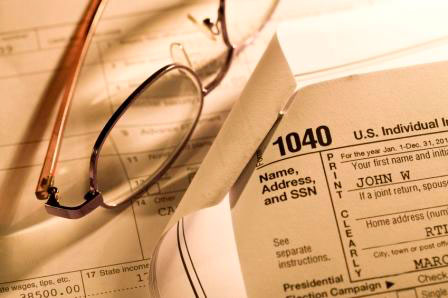The Top Five Ways to Avoid a Tax Audit

If the IRS decides to audit you, there’s little you can do to stop it. However, you can reduce the odds that you'll be singled out for that extra attention in the first place.
While audits are rare, most people would like to avoid them altogether. The percentage of people who actually are audited is extremely small, according to the Internal Revenue Service, but the number has risen slowly since 2008. If the IRS decides to audit you, there is little you can do to stop it. However, you can reduce the odds that you’ll be singled out for that extra attention in the first place.
—Thomas Jensen, managing partner
at Vaerdi Financial
1. Check your figures.
One of the most common red flags for auditors — erroneous data entry — is also one of the most preventable. It seems simple enough to follow the advice to double-check your return. But people often are too careless regarding their taxes, said Thomas Jensen, managing partner at Vaerdi Financial in Portland, Ore.
Jensen advised waiting for all of your income reports, bank and investment statements and other applicable financial paperwork to arrive before starting your tax return.
“Sometimes, people simply forget (income), or they don’t get all of their forms gathered, and they make mistakes that are avoidable,” he said.
Correctly reporting dependents and exemptions, and ensuring that the numbers match, is important because the IRS's automated system will easily detect discrepancies, Jensen said. "And they don’t know if that is a mistake or purposeful,” he added.
TurboTax helps to make sure that your tax return is correct by completing thousands of error checks before you file, so you can be sure that it’s accurate. It also features an Audit Risk Meter that checks your tax return for common audit triggers and shows you whether your risk is high or low.
2. Honesty is the best policy.
Being 100 percent truthful on your tax return is an absolute must to reduce the chances of an audit. Realistically reporting income, deductions, credits and other figures can help keep the tax man at bay, Jensen said.
Not reporting all of your income is a surefire way to attract attention, said Tim Clegg, a Boston-based financial coach and retired tax advocate.
“Outright lying, especially if you earn a six-figure income or are hiding large sums of cash, is definitely a behavior that will get you audited,” he said.
You should be prepared to look an auditor in the eye and support any number you claimed on your return, Clegg said. Self-employed filers, for example, should have receipts for every business deduction they claim.
3. Go vanilla.
The largest pool of filers — which consists of individuals or joint filers who earned less than $200,000 but more than the lowest earners — tends to avoid overt scrutiny, Jensen said. Taxpayers who make more than $1 million a year and those in very low income brackets are the most likely to be audited.
“The wealthy take more deductions, contribute to more charities and other things, so they have a higher risk of getting audited,” Jensen said. “Also, any filer who files a Schedule C is about four times more likely to receive questions.”
Those who are in what the IRS determines to be a low-income bracket — for example, a married couple who earned $50,270 or less in 2011 and had three children — have access to the Earned Income Tax Credit.
Both categories are historically fertile grounds for mistakes in data entry (because of the greater complexity) and for fraud. If you file Form 1040EZ, pay rent, don’t have children and make a modest income, there’s virtually no chance that you’ll be audited “unless you make some sort of mistake with your numbers” or your “costs are out of the norm,” Jensen said.
“For example, giving away more than 30 percent of your income to charity is something most people don’t do,” he said. “That could draw attention.”
4. Claim realistic deductions.
Unusual or unrealistic itemized deductions, either for individuals or small-business owners, may raise a red flag for auditors.
For a sole proprietor who files Schedule C, which details profits and business expenses, reporting losses for three or more years could encourage an auditor to request proof that the filer is actually in business, Jensen said.
Filers who itemize deductions on Schedule A must know what constitutes a legitimate deduction, said Sandy Zinman, the founder of Zinman Accounting and the chairman of the tax committee for the National Conference of CPA Practitioners. Daily commuting to your regular job, for example, is not a legitimate deduction, he said, but a special trip to woo a client is.
"There are a lot of assumptions out there about what should be deductible or not," Zinman said. "An IRS examiner once said to me, 'Anything you have to spend money on to make money on is deductible.' I think that is a pretty safe rule."
TurboTax can help you determine which tax deductions you qualify for. It’ll ask you simple questions about your income, family situation and changes in your tax situation and credits. Then, TurboTax will search through more than 350 tax deductions and credits to help you make sure you get all of the tax breaks you deserve.
5. E-filing helps.
The IRS maintains that filing returns electronically can “dramatically reduce errors,” lowering the odds of an audit.
On Jan. 24, 1986, the IRS received its first electronically filed tax return from a preparer. By 1989, taxpayers in 36 states could file their federal taxes electronically. By 1990, taxpayers throughout the country could file electronically if they expected a refund. Out of the nearly 143 million individual tax returns that the IRS received in 2010, 98.7 million were e-filed.
The error rate for a paper return is 21 percent, the IRS reported. The error rate for electronically filed returns is 0.5 percent.
Remember that audits are few and far between.
The word “audit” strikes fear in many people, but the deep audits that people tend to envision are fairly rare.
In the most common federal audits, taxpayers receive notices asking about certain details of their returns and requesting more information or clarification. This is known as a “correspondence audit.” Even those are rare, Zinman said.
“The probability of being audited is so limited, so minuscule compared to, say, the probability of getting struck by lightning,” he said, chuckling.
According to the IRS, out of the nearly 141 million individual returns that were filed for 2011, only 1.1 percent were audited.
If you filed your taxes using TurboTax, you can get free one-on-one audit guidance from a trained tax professional. Our tax experts will answer your audit questions and help you understand why the IRS contacted you.
Learn more about the audit support guarantee from TurboTax.
Get Next Year's Refund Starting Next Payday
Changing your W-4 withholding can help you get through the recession and keep the good times rolling.
How Short Sales and Foreclosures Affect Your Taxes
If you are like most people, the purchase of a home is probably one of the biggest financial decisions you will ever make.

